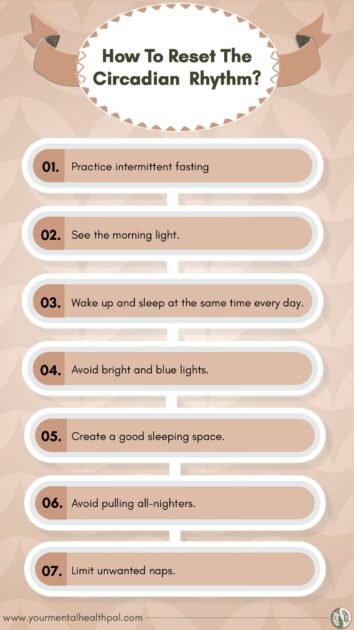Imagine this scenario.
Your alarm went off in the morning and scared you out of your skin. You desperately press the snooze button for just five more minutes of sleep.
You get out of bed, and suddenly, your legs feel heavy. You have a headache, no energy, and an overflowing to-do list to take care of. You want to be your 110% at work or college today, but you’ll be lucky if you can even get to 50%.
If you resonated with any of that, we have a solution – learning how to reset the circadian rhythm.
Circadian rhythm can be defined as the sum total of all the invisible clocks that sync their time and work to help us function adequately. These clocks align more than just your sleep. They affect your appetite, concentration, heart rate, mental sharpness, and much more.
As we rise in the morning, our heart rates, hunger, digestion, and mood lift too. As the day winds up, so does our energy. Melatonin (darkness hormone) kicks in and slows down your digestion, decreases your heart rate, and reduces stress and mental activity. With this, your body temperature starts falling, and you doze off.
This is the ideal scenario, assuming your circadian rhythm is perfectly in sync with your body. But that’s sadly not the case.
As per the Centers for Disease Control (CDC), around 70% of Americans experience sleep issues once a month, and roughly 11% face them on a daily basis.
So, if you are a shift worker, constantly shuffling between day and night work hours, or a parent with a newborn interrupting your sleep. Or maybe you are just someone (like many of us) who has gotten into the unhealthy habit of doom-scrolling social media at night or someone who can’t fall back asleep at night after waking up.
Whatever the reason, learning how to reset the circadian rhythm with a bit of thought and planning can go a long way in improving your sleep and overall health.
To help you get started, we will dive into the most effective and science-backed tips on how to fix your circadian rhythm. Let’s get started.

How to reset my circadian rhythm?

1. Practice intermittent fasting
One of the best and most effective tips on how to fix your body clock is to indulge in time-restricted eating. Research published in Science Journal shows circadian rhythms can effectively synchronize with matching food availability.
Per the findings, fasting for 16 hours can be a great way to fix the body’s internal clock. This process of learning how to reset the body clock is termed circadian rhythm fasting. Once you feel your normal body clock is back to normal, stick to eating regular meals to maintain it.
The scientific reason behind this is simple. Just like morning light signals your brain about morning, the first bite of breakfast can work like an alarm clock for your gut.
This tip on how to reset the circadian rhythm can be highly efficient for travelers who are regularly in fluctuating time zones. It can reduce jet lag and help you settle easily in different situations.
Disclaimer: Intermittent fasting can lead to malnutrition if followed for longer durations. It can also lead to disordered eating and increase some people’s chances of eating disorders. Therefore, it is advised to consult a professional nutritionist before indulging in the practice.
2. See the morning light.
Perhaps the most important tip for you on how to reset the circadian rhythm is to simply expose yourself to morning light as soon as you wake up.
So, open your curtains every morning, turn on the lights, and go out. Try to sit near a window or in a place with adequate natural light at work. If natural light is unavailable, try to ensure the artificial lights are bright. Additionally, try to go out during your break.
The suprachiasmatic nucleus is the body’s central clock that is located near the base of the brain. It works as the primary conductor to all the other clocks in your body. The best part is that it is directly connected to your eyes. Therefore, perceiving light throughout the day is one of the best tips on how to fix your circadian rhythm.
3. Wake up and sleep at the same time every day.
One of the key tips on how to fix your circadian rhythm is by waking up and sleeping at similar times every day.
The idea is simple – your body clock likes to work on a set pattern. Therefore, going to bed and waking up at the same time will help you learn how to reset the circadian rhythm. Unfortunately, this means applying the same rules on weekends as well. So, no lie-ins or snooze buttons for you this week.
However, while doing all this, you must be extremely patient with yourself. You might be bombarded with internal questions like ‘How long does it take to reset your circadian rhythm?’ and much more. But patience and persistence are the real deal here.
So start slow and gradually regain balance. You can try to adjust your bedtime routine by 15 minutes every 2-3 days. So, if you generally crash around 1 a.m., try sleeping around 12:45 a.m., 12:30 a.m., and so on gradually.
4. Avoid bright and blue lights.
If you have been paying attention to our list of tips on how to reset the circadian rhythm, you must understand by now that light plays a huge role in this.
Exposure to light produced by the Sun, device screens, and artificial lights can disrupt melatonin production. Melatonin is a hormone extremely crucial for fixing your body clock.
Therefore, another excellent tip on how to fix your circadian rhythm is to keep your bedroom as dark as possible. Avoid or reduce exposure to blue or bright lights. Additionally, try not to use electronic devices for at least an hour before bed. So, all that bedtime tapping on Instagram isn’t helping your sleep.
If you have to use your devices for work-related activities, use an app that reduces the amount of blue light emitted by your device.
5. Create a good sleeping space.
Creating a good sleeping space is one of the most excellent tips on how to reset the circadian rhythm.
Creating a suitable space is more than just clean sheets and Instagram-pleasing aesthetics. There are a few things that you can do to enhance the quality of your sleeping space. Firstly, try to keep it cool and dark and comfortable. Since your body temperature decreases when you sleep, a well-ventilated room can help balance your internal and external temperature.
Apart from this, use black curtains or wear an eye mask to block further light.
6. Avoid pulling all-nighters.
Pulling an all-nighter is a tempting idea that people have when it comes to learning how to reset the body clock. However, it is only going to make things worse.
As per research by Neurobiol Sleep Circadian Rhythms, sleep deficit does almost nothing to fix your circadian rhythm other than making it worse. Additionally, it will lead to increased stress, fatigue, and lack of concentration the following day.
7. Limit unwanted naps.
If you are trying to learn how to fix your circadian rhythm, chances are you might feel fatigued due to the lack of sleep you might have been getting. Therefore, the temptation to have lie-ins or afternoon naps can be immense.
However, napping is entirely counterproductive to the whole process of fixing your sleep schedule. It’s like hitting it with multiple irregular snoozes, which will definitely not help.
Therefore, one of the best tips on how to fix your body clock is to avoid taking daytime naps. If absolutely necessary, time your naps before midafternoon and make sure they are less than 30 minutes in time.
Conclusion:
Getting a good night’s sleep is challenging, especially if you have a disrupted circadian rhythm. The circadian rhythm affects everything – your sleep, appetite, hormones, concentration, and much more. Learning how to reset the circadian rhythm is important to be more productive and healthy throughout the day.
We hope these tips on how to fix your body clock will help you get started in the right direction. Wondering how long it takes to reset your circadian rhythm? Well, that depends on how disrupted your sleep schedule is. If you are only trying to fix an occasional blip on the radar, you can probably do it overnight. However, long-term and more severe changes will take time.
While disrupted sleep can indicate an out-of-sync body clock, it might have other more serious implications, like sleep disorders. To learn more about the signs of sleep disorders, click here.
To continue learning about mental health daily, subscribe to Your Mental Health Pal.

